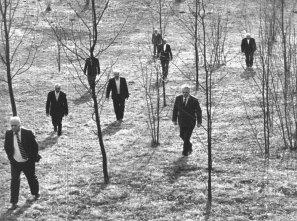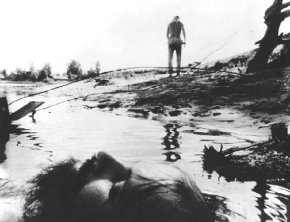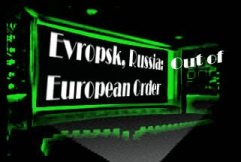Russian Necrorealist Cinema:
The Films of Evgenii Iufit
Masonic Temple
Fifth Avenue
University of Pittsburgh

Evgenii Iufit was born in 1961 in Saint Petersburg, Russia.
In the early 1980s he began working as a painter and art photographer.
In 1985 he set up the first independent film studio in Russia, MZHALALA FILM, which brought together artists, writers, directors and others sympathetic to radical aesthetic experimentation.
At this studio Iufit made a number of films which have been shown at the world's major film festivals including Montreal, Locarno, Toronto, Rotterdam, and Moscow. His film, Daddy, Frost is Dead, was awarded the Grand Prix at the Rimini Film Festival in Italy. Iufit's paintings and photographs have been shown in major exhibitions of contemporary Russian art since 1985, at the State Russian Museum, St. Petersburg; The Museum of Modern Art, New York; Stedelijk Museum, Amsterdam; Kunstahalle, Dusseldorf; Kunstverein, Hanover, and The Museum of Modern Art, Mexico City. Works by Iufit are to be found in museums, galleries, and private collections both in Russia and abroad.
The Program
Notes on the Films
A young sailor descends from a local train. He goes to a nearby forest, which is full of strange men in medical uniforms behaving in an absurd and eccentric manner. The sailor falls under their influence and masochistically gives himself up to them only to be disemboweled by the werewolf orderlies. The sailor's last unconscious image is a "white ship sailing towards the horizon"—a Soviet symbol for happiness and joy.
Werewolf Orderlies is the first of Evgenii Iufit's films in which the necrorealist aesthetics of social grotesque and black humor appear.
An eccentric and absurd comedy with endless nonstop fighting, chasing, murders, and suicides which are intercut with Soviet symbols of peace and freedom—white doves flying away from the hands of "pioneers"—and documentary footage of the pioneers' everyday lives.
Spring demonstrates the precision of Yevgenii Iufit's structural and editing techniques. It was conceived as a manifesto of necrorealism.
The film combines intuition, an interest in the unconscious mind, and shock tactics (traditions of the 1920's avant garde) with social issues of Soviet Russia.
The irrationality of the human psyche, sadomasochism, and suicide are the leitmotivs of this film. The documentary footage of airplanes and pilots—symbols of courage and honor—become an unexpected counterpoint to the main structure of the film. The combination of documentary footage and poetic storytelling with sever northern setting reinforce the ascetic atmosphere of Suicide Monsters and give its self-destructive characters heroic and noble appearance.
This three-minute film is about a day in the lives of a group of pacifists hiding from a war tribunal in the basement of a destroyed house and enduring all the difficulties of war with great courage.
|
A military group of alpinists are selected to carry out a secret mission. The fate of humanity depends on their success. The rules of the mission require the death of each participant once his or her task is accomplished. After killing one of their colleagues and splitting into several groups, the alpinists continue their journey. But the human unconscious doesn't follow military orders. Having once committed murder, the "knights" can't control their desire to kill. They forgot their mission... and kill each other instead.
|  |
 |
An experimental work in the necrorealist style, loosely based on Tolstoy's "The Vampire Family."
|
|
The necrorealist science fiction plot involves a team of scientists attempting to cross a human being with a tree, and a special unit dispatched to hunt down the zombie-like mutants created in a previous, failed experiment. | 
|
 |
An experimental black-and-white meditation on the complex, ever-changing relationship between a filmmaker and his subject matter.
The narrative, which is devoid of any conventional plot, seems entirely based on the performers' improvisation. But there are enough clues to suggest that the film is meant as a cautionary tale about artists who get too intimately involved with their material. Indeed, the filmmaker gets so close to his recorded event that at the end he loses all detachment and himself becomes an object and a victim. -- Variety Film Reviews
|

The program is curated by Masha Godovannaia.
Russian Necrorealist Cinema: The Films of Evgenii Iufit has been made
possible with the support of Finnair, the Museum of Modern Art, and Anthology
Film Archives.





